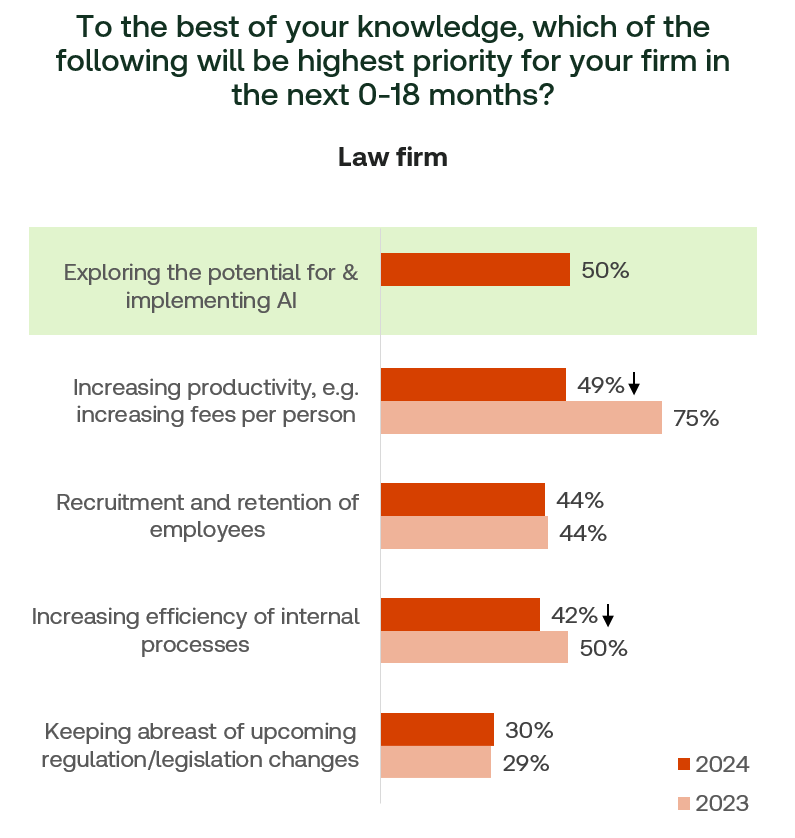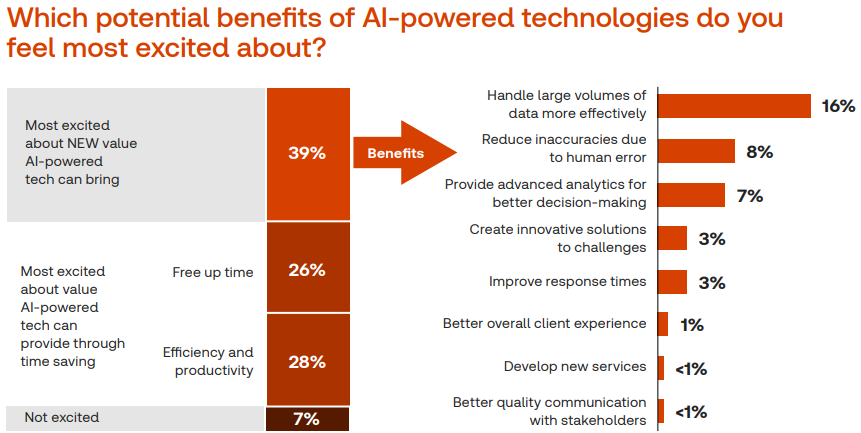This year’s second quarter was a strong one for law firms, with growth across all key factors that allowed for continued investment in the development and implementation of AI technology
By almost all measures, this year’s second quarter was a time of high tides for many law firms, as evidenced by improvements in all the key performance factors tracked by the Thomson Reuters® Institute Law Firm Financial Index (LFFI). The Index itself reached a score of 67, marking an 8-point increase and the third-highest score since the Global Financial Crisis.
Notably, this heightened performance included improvements in lawyer productivity, which saw an uptick in hours worked per lawyer for the first time in more than three years. Powering this increase in productivity was growth in overall average legal demand of 2.4% compared to a year earlier, driven primarily by strong performances in several counter-cyclical practice areas as well as smaller levels of growth in transactional practices. Indeed, this diversified demand growth, in combination with historic growth in worked rates, led to multifaceted revenue growth, making Q2 2024 arguably one of the strongest quarters for law firm financial performance in recent history.
However, for all the positivity of the LFFI, media and customers alike zeroed in on the return of productivity growth and whether the hot topic of the past few years — generative artificial intelligence (GenAI) — had any role to play in firms’ performance.
Making AI and its benefits a priority
To begin to answer this, we first must look at hints of law firm investment. While growth in overhead expenses has slowed, spending on technology and knowledge management remained historically high, following the trend we saw in Q1. Ever since the release of Chat GPT in Q4 2022, this trend in tech-related spending among law firms has been consistently accelerating, often outpacing inflation rates and growth in overall overhead expenses.

According to Thomson Reuters’ recent 2024 Future of Professionals report, 50% of survey respondents from law firms said that exploring and implementing AI is their top strategic priority, suggesting that many lawyers recognize the potential for AI to revolutionize the way legal services are provided, even while acknowledging that we are still in the early days of testing out the capabilities of AI technology.
According to the Future of Professionals report, professionals across a number of industries were asked about which potential benefits of AI technology they are most excited about. We can see that 93% of respondents reported being excited about the benefits AI-powered tech can bring, with more than half of them saying they were most interested in the time-saving possibilities of the technology. Interestingly, the other half said they were interested in the additional value that would be possible with this tech, with handling large volumes of data more effectively cited as the top value-adding possibility.

Did AI play a role?
Thinking about how this would specifically help law firms, respondents said that any additional value gained would be focused on leveraging GenAI to automate routine tasks like legal research, brief drafting, and document review. In this way, proper implementation of technology could allow lawyers to focus more on additional billable hours or completing more high-value work, potentially increasing both productivity and fees.
Although measuring real productivity gains from technology can be challenging, research suggest that GenAI can significantly enhance professional efficiency. However, to answer the question of whether AI played a role in the bump in productivity in Q2, the answer is most likely not.
The productivity in the LFFI is measured by hours worked per lawyer. Given that one of the anticipated benefits of AI is time–savings, it seems logical that the number of hours lawyers are putting in would be declining, at least initially. That is, unless lawyers have quickly become very adept at finding additional work to overcome the resulting time-savings from AI. In other words, if GenAI is actually saving time, lawyer productivity as traditionally understood should be getting worse, not better.
The case could be made that GenAI is being deployed on non-billable activities to free up time for billable activities, and given the capabilities of AI today, administrative reductions likely are a key selling point. This, of course, makes attributing the current short-term productivity gains more feasible. However, for GenAI to fully deliver on its promise, the act of completing billable tasks quicker and more efficiently is crucial, suggesting that the path of hours worked per lawyer will continue its downwards trek.
GenAI impact on profits
This bring up a question that has been raised by law firms: How GenAI usage may impact their profits. The thought is that fewer lawyers’ work hours posted due to increased efficiency could lead to many law firms, logically, not being able to bill clients for as many hours.
While examples of work that has been significantly expedited by Ai-driven automation tools have existed for a while, this shift has not negatively impacted profitability. Instead, it has allowed lawyers to focus on higher-value and more profitable work, as we’ve noted. Thus, law firms may eventually achieve their second-most cited priority for the technology mentioned earlier, increasing their fees per lawyer, albeit in a slightly different way.
Data suggests that continued experimentation and interest in GenAI strongly exists, but there is no sign as yet that these technologies have been implemented to the extent necessary to impact the legal industry’s performance. The strength of the second quarter indicates that the market is in a healthy position, allowing for additional capital to be focused on implementing AI into work processes further.
While we may not be seeing the effects of GenAI just yet, if current trends in law firms’ investment into the technology continue, the legal sector might be on the brink of a revolutionary transformation.
You can download a full copy of the Thomson Reuters® Institute Q2 Law Firm Financial Index report here.







